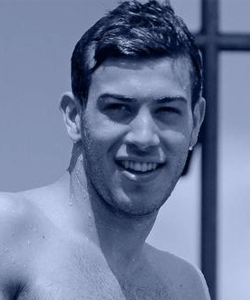Divers often recite an old adage that “diving is 99 percent mental.” For most of my career, I understood it in the context of sports psychology, supposing that peak performance is dependent upon entering the elusive “zone.” To others, the aphorism refers to the understandably unsettling prospect of hurling oneself into the air from various heights.
In fact, it is often the fear of learning new dives that leads youngsters to hang up the towel (literally, in this case). Though divers and spectators alike agree that fear and diving are tightly related, it was not until almost the peak of my career that the exact relationship between the two—and the meaning of this diving proverb—became clear to me.
My childhood fearlessness is one of the factors that led me to the sport. But my diving career really began before my first lesson or having set foot on a diving board—even before I knew how to swim. Around the age of two, my family visited some friends in Florida. They had a pool in their backyard, with which I became enamored. While the adults were busy chatting, I made a run for it and took the plunge, fully clothed. Our host, half-impressed, half-concerned, asked my parents whether I knew how to swim, to which they responded, “No!” I was promptly retrieved from the depths by adults unaware of the glimpse they had into my athletic future.
In the years to come, I was drawn to diving boards. There was the crescendo of adrenaline associated with climbing the stairs to the board, walking to its end, and planning the dive in my mind. The feelings of freedom, weightlessness, and almost disbelief while flying through the air; finally, the feelings of accomplishment and safety upon being consumed by the water.
I taught myself the basics of diving at summer pools, constantly yearning to graduate to higher and higher boards. At the age of eight, I began formal training, and, from that point, diving was a central component of my identity.
As I grew older, I became more attuned to the potential consequences of a dive gone awry. While I suffered occasional injuries from botched dives and gave myself a few frights, I never had any life-threatening, catastrophic events. Nevertheless, this type of mistake haunts the minds of all divers, even the most experienced. With excellent coaching, I pushed through these fears to learn a competitive list of dives from the 10-meter platform during my teen years—a rite of passage for all platform divers.
At the 2010 USA Diving Winter National Championships, the competition to qualify for that year’s FINA Diving World Cup, I faced my biggest scare to date. In the third round of the finals of the 10-meter event, I hit the platform on a dive that was a favorite of mine—inward three-and-one-half somersaults tucked. The inward category of dives, which involves jumping from the board backwards and flipping toward the platform, requires fine control and awareness of your distance from the edge. Too much may make it difficult to complete your dive, while not enough can put you at serious risk.
As I initiated my dive, everything seemed to be going according to plan; I completed my first flip on the ascent after an aggressive jump. As I continued rotating through the second flip, however, I felt my feet make unexpected contact with something very hard—I had struck the platform. With less than a tenth of a second to react, I ducked my head out of the way. I lost my sense of awareness in the air, and spiraled toward the water in an uncontrolled freefall. I landed feet first, completing four flips and failing the dive. Under the water, I began processing what had just transpired, and upon surfacing, the silence of the dumbstruck crowd only confirmed the gravity of the mistake I had made. While I had not seriously injured myself, I felt shaken to the core by the realization that I was mere centimeters away from an entirely different outcome. In addition, I had all but taken myself out of the running for the U.S. World Cup team.
However, the contest was not over yet. My coach asked whether I was all right, and I said yes. He told me I still had three dives left and that I knew what I was doing. In that moment, the doubt that had crept into my mind from the near miss was replaced by the trust I had in myself and my training. I believed that I would not make that mistake again, and my fear melted into determination. I followed up in the next two rounds with dives that received all 10s from the judges, and I narrowly finished in second place to earn a spot on the World Cup team.
While I was excited about the result, what really mattered to me in that moment was that I had uncovered the truth about diving. At its core, diving is a mental game you play not with your competitors, but with yourself. The rules are technical in nature: execute challenging dives with minimal splash and ensure your safety by identifying and correcting your mistakes. But the overall aim is to leave your comfort zone behind, to conquer your fears.
McCrory ’14, a medical student at Duke, was a 2012 Olympic bronze medalist in the synchronized 10-meter event and a four-time NCAA champion in the platform event.

Share your comments
Have an account?
Sign in to commentNo Account?
Email the editor